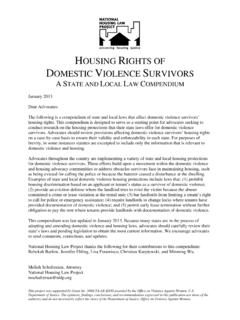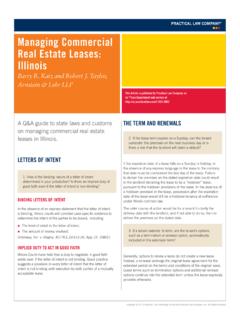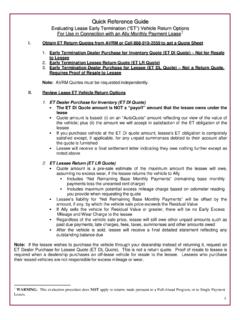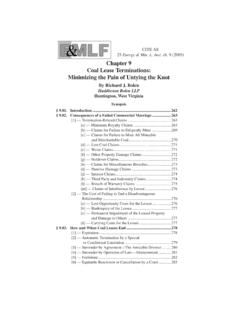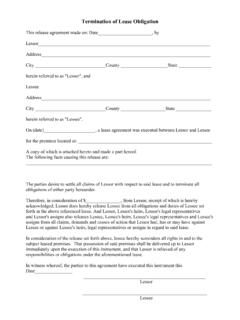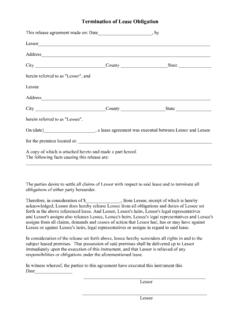Transcription of California Civil Code § 1946.7 Toolkit: Early Lease ...
1 California Civil Code Toolkit: Early Lease termination for Survivors January 2016 Dear Advocates: California Civil Code allows survivors of domestic violence, sexual assault, human trafficking, stalking, elder abuse, and dependent adult abuse to end their leases Early . This law empowers survivors to leave abusive situations while avoiding the usual penalties associated with breaking a Lease . The toolkit is meant to serve as an introduction to the law s protections, reflects amendments made to the law that are effective this year, and includes materials for both survivor advocates and their clients. The toolkit contains: 1. A brochure for survivors in English 2. A brochure for survivors in Spanish 3. A Q & A for advocates 4. A sample 14-day notice that survivors can use to end their leases. 5. A template for a qualified third party statement 6. Safety planning concerns that should be addressed when using the law. 7. The text of Civil Code (effective January 1, 2016) Please note that the brochures (Items 1 & 2) are designed with room to include your organization s logo and contact information.
2 If you have further questions concerning this toolkit or the law s protections, please contact: Karlo Ng, Staff Attorney National Housing Law Project (415) 546-7000, ext. 3117 9. What needs to go in this document signed by a professional? The law contains specific language that should be included in the document. Addi-tionally, the law requires that the victim in-clude a signed statement that he or she has experienced abuse. For help preparing this document, you should contact your local legal aid or domestic violence agency. 10. What will happen to my security de-posit? Your deposit will be treated the same way as if you had moved out at the end of your Lease . The landlord must return your depos-it within 21 days after you leave. The land-lord can deduct money for unpaid rent, damages beyond ordinary wear and tear, and cleaning charges. 11. What if I have a month-to-month rental agreement? You may not need to use Civil Code if you have a month-to-month rental agree-ment.
3 You might be able to move by simply giving your landlord written notice that you will leave the unit in 14 days. However, check with a legal aid attorney to figure out the terms of your rental agreement. Know Your Rights: Breaking Your Lease to Escape Violence Are you or a household member a victim of domestic violence, sexual assault, stalking, human trafficking, or elder/dependent adult abuse? Do you need to break your Lease and move to protect your safety? Civil Code may help you. Civil Code January 2016 12. What if I have roommates? Your roommates can remain in the unit, even after you move out. They must continue to pay the full amount of rent, including your share. 13. Can my landlord tell anyone that I am a victim of abuse? The law prohibits your landlord from sharing any information you provide to the landlord about the abuse unless you give the landlord written permission, or the landlord is required to do so by another law or court order.
4 The landlord may contact the professional who signed a document stating you were abused to confirm that the document is true. 14. What if I need help to use the law? If you believe your landlord isn t following the law, contact a legal aid attorney, fair housing agency, or domestic violence agency. 1. What is Civil Code California Civil Code allows certain vic-tims of abuse who have a restraining order, a police report, or documentation from a qualified third-party to break their leases without owing additional rent. This law protects victims of: Domestic violence; Sexual assault; Stalking; Human trafficking; Elder abuse; or Dependent adult abuse. The law also protects family members who live with the victim of abuse. 2. What is the law s purpose? Usually, if you move before your Lease ends, you can be held responsible for all the rent that would be owed until your Lease expires. Your landlord can sue you for this money.
5 Civil Code allows you to notify your landlord, break the Lease , move out, and no longer be required to pay rent. 3. When can I use this law? You can use the law if you: Rent and have a Lease ; Have a restraining order/protective order, a police report, or a signed document from a certain kind of professional; and Need to move because you are, or a family member living with you is, a victim of do-mestic violence, sexual assault, stalking, human trafficking, or elder/dependent adult abuse. 4. How do I tell the landlord? You must notify your landlord in writing that you are (or a family member living with you is) a victim of domestic violence, sexual assault, stalking, human trafficking, or elder/dependent adult abuse, and that you want to end the Lease . Be sure to date the notice. 5. How much notice must I give the land-lord? You must give the landlord at least 14 days notice before the Lease can end. You are free to leave your apartment anytime after giving your landlord the notice.
6 However, you will still be responsible for the rent up to 14 days after giv-ing the landlord the notice. 6. What type of proof do I need? You must give your landlord one of the follow-ing: The Right to Break Your Lease to Escape Violence a copy of a restraining order or protective order; a police report showing that you are the vic-tim of domestic violence, sexual assault, stalking, human trafficking, or elder/dependent adult abuse; OR a signed document from a certain type of professional that verifies your status as a victim of abuse. 7. If I have a police report or restraining or-der, how long do I have to break my Lease ? The police report or restraining order/protective order can be no more than 180 days old. 8. Can I break my Lease without a police re-port or protective order? Yes. California Civil Code allows you to break your Lease without obtaining a protective order or police report. You can break your Lease by obtaining a signed document from a qualified third party, or a professional such as a doctor, registered nurse, psychologist, li-censed clinical social worker, domestic vio-lence or sexual assault counselor, among oth-ers.
7 You must also sign this document. If you need help obtaining this type of document, your local legal aid office or domestic violence agen-cy can help prepare the document and direct you to a professional who can sign it. El art culo del C digo Civil puede ayudarlo. 9. Qu se debe incluir en este documen-to firmado por un profesional? La ley contiene lenguaje espec fico que debe incluirse en el documento. Adem s, la ley exige que la v ctima incluya una declaraci n firmada que indique que l o ella ha sufrido maltrato. Para obtener ayuda para preparar este documento, debe ponerse en contacto con la oficina de asistencia legal local o la agencia de violencia dom stica. 10. Qu sucede con mi dep sito de ga-rant a? Su dep sito se considerar de la misma for-ma que si se hubiese mudado al finalizar su contrato de arrendamiento. El arrendador deber devolverle el dep sito en el plazo de 21 d as despu s de mudarse. El arrendador podr deducir dinero por alquileres adeuda-dos, da os que exceden el desgaste normal y gastos de limpieza.
8 11. Qu sucede si tengo un contrato de arrendamiento por mes? No es necesario usar el art culo del C digo Civil si tiene un contrato de arrenda-miento por mes. Puede mudarse notificando simplemente a su arrendador por escrito que abandonar la unidad en 14 d as. No obs-tante, verifique con un abogado de asisten-cia legal para comprender los t rminos de su Conozca sus derechos: Rescisi n de arrendamiento para escapar de una situaci n de violencia Es usted o un integrante de su hogar v ctima de violencia dom stica, ataque sexual, acecho, trata de personas o mal-trato de ancianos o adultos dependien-tes? Necesita rescindir su contrato de arren-damiento y mudarse para proteger su seguridad? C digo Civil Enero 2016 contrato de arrendamiento. 12. Qu sucede si comparto la vivienda con otras personas? Sus compa eros de vivienda pueden continuar en la unidad, aun despu s de que usted se ha-ya mudado. Deber n seguir pagando el importe total del alquiler, incluida su parte.
9 13. El arrendador puede decirle a cualquie-ra que soy v ctima de maltrato? La ley le proh be al arrendador compartir infor-maci n que usted le proporcione sobre el mal-trato a menos que usted le brinde al arrendador un permiso escrito o el arrendador deba hacerlo debido a otra orden judicial o legal. El arrenda-dor puede ponerse en contacto con el profesio-nal que firm un documento que indica que us-ted sufri maltrato para confirmar que el docu-mento es verdadero. 14. Qu sucede si necesito ayuda para aplicar la ley? Si considera que el arrendador no respeta la ley, comun quese con un abogado de asesora-miento legal, una agencia de vivienda justa o una agencia de violencia dom stica. 1. Qu es el art culo del C digo Ci-vil? El art culo del C digo Civil de California permite a determinadas v ctimas de maltrato que tengan una orden de restricci n, un informe poli-cial o documentaci n de un tercero calificado rescindir su contrato de arrendamiento sin que-dar debiendo un alquiler adicional.
10 Esta ley protege a las v ctimas de: Violencia dom stica; Ataque sexual; Acecho; Trata de personas; Maltrato de personas ancianas o Maltrato de adultos dependientes. La ley tambi n protege a los familiares que viven con la v ctima de maltrato. 2. Cu l es el objetivo de la ley? Generalmente, si se muda antes de que termine el per odo de arrendamiento, puede ser respon-sable de todos los alquileres que se adeudar an hasta que venciera su contrato de arrendamien-to. El arrendador puede demandarlo para exigirle el pago de este dinero. El art culo del C -digo Civil le permite notificar al arrendador, res-cindir el contrato de arrendamiento, mudarse y no tener que seguir pagando el alquiler. 3. Cu ndo se puede usar esta ley? Puede usar la ley en los siguientes casos: Si alquila y tiene un contrato de arrenda-miento; Si tiene una orden de restricci n/orden de protecci n, un informe policial o un docu-mento firmado por determinado tipo de pro-fesional y Si necesita mudarse porque usted o un inte-grante de su familia que vive con usted son v ctimas de violencia dom stica, ataque se-xual, acecho, trata de personas o maltrato de ancianos o adultos dependientes.
